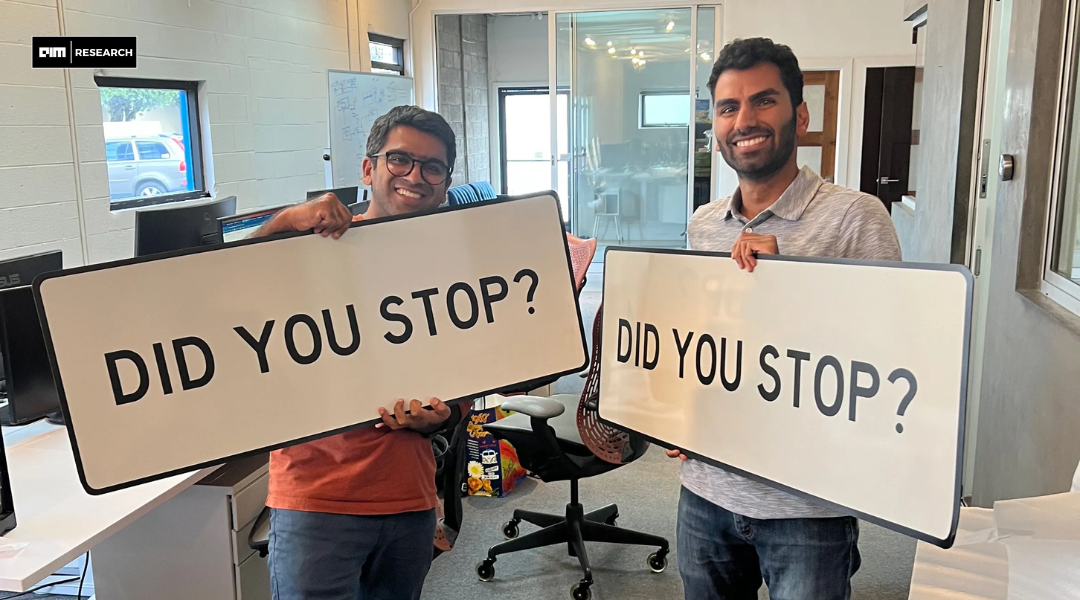

Obvio, a San Carlos-based startup, just raised $22 million in Series A funding to scale its AI-powered traffic camera system. Led by Bain Capital Ventures with participation from Khosla Ventures and Pathlight Ventures, the round reflects growing investor interest in rethinking road safety with technology. But Obvio’s ambitions go beyond building a more efficient ticket machine. They’re trying to make traffic enforcement both more effective and more equitable. Whether they can pull that off remains to be seen.
Founded by Dhruv Maheshwari and Ali Rehan, former colleagues at Motive, where they worked on dashcams for commercial fleets, Obvio is focused on curbing reckless driving in urban and suburban neighborhoods. Their product is a solar-powered pylon topped with AI-driven cameras, capable of detecting a range of traffic violations: speeding, stop sign running, crosswalk infractions, illegal turns, distracted driving, and more.
“Obvio was built to provide real accountability to drivers and avoid so many preventable injuries and fatalities,” said CEO Ali Rehan. “I see the need for change first hand. Every day I walk my daughter to school and see drivers blowing through stop signs.”
That personal perspective shapes how the company has approached its pilot deployments. In Prince George’s County, Maryland, after two children were killed near a school, Obvio installed stop sign cameras that led to a 50% reduction in violations within eight weeks. “Even if I had 30 more officers, I wouldn’t be able to accomplish what we did with Obvio,” said Dan Franklin, police chief of Morningside, Maryland.
Unlike older traffic camera systems, Obvio’s technology, they say, is designed for minimal infrastructure, installable in under a week, solar-powered, and processing data locally via edge AI. Non-violation footage is deleted after 12 hours; no facial recognition is used. Obvio emphasizes privacy as much as enforcement. “Yes, in the short term, you can maximize profits, and erode those values, but… it’ll create enemies,” said Bain’s Ajay Agarwal. “Great founders are willing to sacrifice entire lines of business… in pursuit of the ultimate mission.”
Still, automated enforcement technology is far from smooth. Critics have long argued that surveillance tools can reinforce bias, generate revenue over fairness, and erode public trust. The founders seem aware of the concern. “Automated enforcement should be used in conjunction with community advocacy and community support,” Maheshwari said to TechCrunch. “It shouldn’t be this camera that you put up that does revenue grabs and gotchas.”
The company says its system is effective because it integrates the traditionally siloed elements of traffic safety: education, engineering, and enforcement. The visible pylons serve as deterrents and reminders, while their backend system automates ticketing and data reporting for local governments. Cities get the hardware for free; Obvio earns money through a cut of citation revenue, a model that varies by jurisdiction.
Obvio enters a growing field. Competitors like Derq offer more comprehensive smart city platforms, integrating traffic sensors and AI to support autonomous vehicles and infrastructure planning. Based in Dubai and Detroit, Derq has received recognition from the U.S. Department of Transportation and backing from AT&T and e& Capital. While Derq aims at macro-scale innovation, Obvio is focused on “immediate, community-level traffic safety solutions,” emphasizing ease of deployment and behavioral change.
Yet the core challenge facing Obvio, and automated traffic enforcement as a whole, goes beyond cameras and code. Obvio is aware of that. As Saqib Ali, a founding engineer at Obvio, writes, “Although several traffic rules have been strictly defined, they still become fuzzy without relevant social context.” For instance, should a biker who jumps a red light to avoid being intimidated by an aggressive SUV be fined? “Identifying driving cues, power dynamics and cultural norms that shape real-world interactions would enable us to distinguish between a reckless speeder and someone responding to an emergency.”
In this light, Obvio’s solution is promising but incomplete. The AI can detect patterns, but it struggles to interpret nuance, the quiet gestures and improvised negotiations that human officers understand instinctively. Embedding those capabilities will involve better algorithms, and a rethinking of how enforcement systems account for social context.
“We’re on a mission to curb reckless driving and reduce the 40,000 annual deaths that happen on our roadways,” Maheshwari said. With deployments in five cities already and plans to scale nationally, the funding will allow Obvio to expand its team and footprint. The big question is whether it can grow without replicating the blind spots of the systems it aims to replace.
📣 Want to advertise in AIM Research? Book here >

Cypher 2024
21-22 Nov 2024, Santa Clara Convention Center, CA
A Vendor Briefing is a research tool for our industry analysts, and an opportunity for a vendor to present its products, services and business strategies to analysts who cover the vendor specifically or a related technology or market.
AIM Research encourages technology vendors and agencies to brief our team for PeMa Quadrants, when introducing a new product, changing a business model, or forming a partnership, merger, or acquisition.


